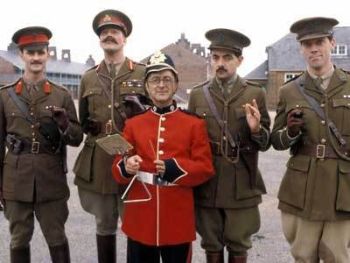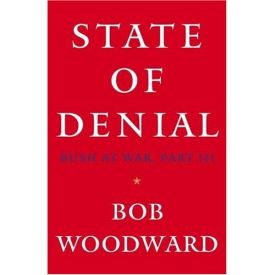Smug Self-righteousness
From The New CriterionIn this election year, to be a voter watching the conversation between the media and the politicians — or, now that there are six times as many reporters as there are delegates at the party conventions, between the media and the media — is a bit like being an invalid who is forced to listen to his doctors and his relatives discussing what is to be done with him as if he were not in the room. Will the voters go for this? Will they be turned off by that? Hey, Doc? I’m right here! But the media, like the doctors and the relatives, think they know what’s best for me, and my views on the subject would only be a distraction from the highly sophisticated process of ratiocination by which they have already discovered it. Why do I employ such highly-trained professionals, after all, if I am only going to try to tell them what to think?
Thus, for all their complaint about the “scripted” conventions, and their cutting back on the coverage given to floor speeches, the media do not stint themselves of their opportunities for “analysis.” In fact, the more scripted the convention, and therefore the more discounted its ostensible meanings, the more necessary it is for the media’s expertise to inform us of what it all really means. “Yes, yes,” says the doctor patronizingly, “of course we know you’re impressed with Mr Kerry’s record of military service. We knew that by our scientific methods long before you yourself did. The real question is, when you come to cast your vote, will you remember this as the reason why you should vote for Mr Kerry or will the convention’s overall positive tone and suppression of so many Democrats’ hatred of the President make you forget why you should vote against Mr Bush? My learned colleagues and I all have our own theories about this, but pardon us if we point out that a lay person like yourself can hardly be in the best position to judge them.”
Well, they have a point. Quite probably I haven’t got the best vantage point for guessing what I’m likely to do or not do on election day. But then it is also true that the theoretician’s trade has its own hazards, among which is the tendency to suffer from what was called in connection with the report of the 9/11 commission this summer “Groupthink.” Take for instance the reaction in the media to the convention speech of John Edwards, the Democratic nominee for vice president. “Too nice for their own — and our — good” as the headline to Tom Shales’s review in the Washington Post put it. It’s still hard for me to get used to the idea of the paper’s television critic reviewing political speeches as if they were dramatic performances, but that just goes to show you what a fuddy-duddy I am. Obviously they are performances and should be reviewed as such. And yet the grounds of Mr Shales’s assessment is not aesthetic after all, as the headline reveals, but political.
In other words, the basis on which Mr Edwards’s speech is judged “too nice” is, more or less avowedly, that it might lessen the ticket’s chances of beating the incumbents in November and therefore will not be good either for them or for us. Or the world, Shales might have added. He decried what he called “the Democrats’ namby-pamby decision to go positive — not to attack the arguably very, very vulnerable administration of George W. Bush.” I love that “arguably.” And so the appearance of “objectivity” is saved. Shales’s anxiety about what he calls this “pall of niceness over the proceedings” was echoed by Peter Jennings on ABC, whose own political views are scarcely more opaque. Jennings asked ABC’s political director Mark Halperin what he called “a tactical question,” saying: “If John Edwards is going to go around the country talking enthusiastically, optimistically even blithely about the Democratic Party, who’s going to attack the President and Vice President Cheney?”
It takes a very special kind, a very media kind, of naïveté to worry about the danger that the incumbent administration might not be attacked enough in the year of MoveOn.org and Fahrenheit 9/11. It’s the same kind of naïveté that kept mindlessly repeating the media consensus about that “nice” Mr Edwards. Yet in the speech that all the experts agreed was too nice, Edwards had said that America’s armed forces “deserve a president who understands. . . on the most personal level what they have gone through — what they have given and what they have given up for their country.” Unlike, that is to say, certain presidents he could name — if he wasn’t so unfortunately nice. “Edwards links Bush war record to Iraq body count” headlined the Times of London, presumably less influenced by the media consensus than American reporters and editors. Neither Shales nor Jennings, however, even noticed the insinuation of President Bush’s callous indifference to the deaths of American soldiers. That was just routine Democratic “spin” to them.
And then, of course, everybody in the American media already knew that Edwards was nice. As Halperin said in reply to Jennings’s question, Edwards had seemed “almost constitutionally unable to be in attack mode when he was running to try to beat John Kerry for the nomination.” Now you’d think that a man “almost constitutionally unable to be in attack mode” could hardly have made a fortune, as Edwards did, out of suing doctors and insurance companies. But of course an essential part of a good trial lawyer’s skill is the ability to persuade a jury, preferably of the cognitively challenged, that he is the “nice” guy while the people he is in the process of ripping the throats out of are the nasty ones. Clearly, Messrs Shales and Halperin are just the kind of people Edwards would want to see in a jury box, though media Groupthink would probably make any other political reporter in 2004 equally useful from the point of view of the plaintiff’s bar.
This is because the power of The Story as it has been adopted by the media in this election year — bright, courageous, idealistic and high-minded Democrats challenge stupid, corrupt, arrogant and uncaring Republicans — virtually requires that Edwards be nice. For him to be anything else would require a total re-write of the media’s script. For if the political conventions are scripted, the media’s commentary and interpretation of them are hardly less so. The success over the summer of Michael Moore’s Fahrenheit 9/11, a bit of transparent political propaganda masquerading as a “documentary,” was largely owing to the extent to which it played to the same media stereotypes. If everybody — or everybody likely to be in your audience — already knows that President Bush is stupid, corrupt, arrogant and uncaring, it is the easiest thing in the world for a skilled editor, turned loose on the acres of videotape of any sitting President, to make him look all that and worse.
Yet even in acknowledging as much, the spokesmen for the media consensus were quite happy to have their prejudices confirmed anyway. “All right, you can make anyone into a goofball with a selection of unflattering shots and out-of-context quotations,” wrote David Edelstein of Slate in an article sub-titled: “Michael Moore’s Fahrenheit 9/11 is unfair and outrageous. You got a problem with that?” But it’s OK if he really is a goofball. “It is so very easy,” Edelstein goes on, “to make George W. Bush — with his near-demonic blend of smugness and vacuity — look bad.” Near-demonic? Gosh! Who knew that it was as easy at that. But of course the “near-demonic” comes from the same place that the “smugness and vacuity” come from. It’s just what everybody — or everybody Mr Edelstein knows — is saying about President Bush this summer, even if it is not exactly susceptible of independent verification.
Obviously, Michael Moore has found in Edelstein the same kind of patsy that John Edwards found in Tom Shales. No wonder he hardly even bothers to pretend that he is a real documentarist. Why should he when mere innuendo and malicious suggestion are welcomed even by those who know that they are innuendo and malicious suggestion? A real documentary film-maker looks for the truth beneath a welter of conflicting data, but none of Michael Moore’s data conflict in the slightest. All goes to confirm what his audience thought it knew before it ever walked in the door of the cinema. And that audience, perhaps not coincidentally, turned out to be liberal and Democratic in the same overwhelming proportions that the media itself is. Could there be a conspiracy at work here?
Or perhaps you didn’t know that the media were liberal and Democratic? According to a study by the Pew Research Center for the People and the Press published last May, 34 per cent of journalists surveyed who worked for national news outlets were self-identified “liberals” — up from 22 per cent in a similar survey nine years ago — or roughly double the percentage in the population as a whole. Meanwhile, only seven per cent called themselves conservatives (up from four per cent nine years ago), even though about a third of all Americans do. We might therefore expect to find close to five times as many Kerry-Edwards supporters as Bush-Cheney supporters in the media, even assuming that the 54 per cent of the survey’s respondents who described themselves as “moderate” remained as scrupulously neutral in the contest as Leonard Downie, executive editor of the Washington Post, who doesn’t even vote for fear of the accusation of bias.
But of course they don’t. When John Tierney of the New York Times did an informal survey of 153 of his media colleagues gathered in Boston for the Democratic convention, he found that the regional journalists broke 3-to-1 for Kerry while among the Washington-based ones there were twelve Kerryites for every Bush voter. If there is any good news for Republicans in these numbers it is that a survey in 1993 showed a similar ratio of Clinton to Bush Senior voters among the fourth estate. So at least things may not be getting worse. Yet Tierney, though he has occasionally shown signs of conservative tendencies himself, was quick to discount the significance of his findings. In an interview with Bill O’Reilly on the Fox News Channel — identified as “conservative” by 69 per cent of the respondents to the Pew Survey, even though only 20 per cent were prepared to call the New York Times “liberal” — he said: “I think most reporters are driven not by ideology, but they’re really driven by, you know, the same as people in most professions, by what helps them professionally.”
This may be a good moment to discuss this favorite verb in the journalistic lexicon of the last 10 or 15 years. The metaphor of people or even inanimate things who are “driven” by this or that is a particularly useful one for the reason that Tierney shows here. Not “driven” by ideology, he says, journalists must therefore be “really driven” by something else, even though we know that in our own lives motivations are more often multiple than they are single — and especially so when they are motivations to do different things. Journalists may well be “driven” by professional ambition in a great many of the things they do, perhaps most of them. But that tells us nothing about whether or not they are “driven” by ideology in some of them, including their choice of words, their attribution of motivations to others, their assumptions about how issues should be defined or their willingness to hunt for their career-advancing stories in one area — say the President’s National Guard service — rather than another — say his published aim of advancing democracy in a part of the world where democracy has never been known before.
Nor does it tell us anything about the extent to which professional advancement may itself depend on a reporter’s demonstration by such subtle means as these that he has the right ideology. Assumptions are funny things: often hard to discern and rarely deigning to show themselves in the driver’s seat. Yet if you know where to look for them they show up all the time in flashes, as when someone uses an expression like “near-demonic.” These are revealing about the writer, but also about his audience, which he can be confident will make no objection even though it will be as indignant as he, on another occasion, about the President’s description of the avowed enemies of the United States as an “axis of evil.” For those of us with a sense of irony there is plenty to amuse us in this election year.
For example, David Remnick confidently announced in a “Talk of the Town” item in The New Yorker recently that “George W. Bush is the worst president the country has endured since Richard Nixon” and advocated voting for Kerry on the less-than-enthusiastic ground that “even mediocrity would be an improvement.” This, mind you as if it were a simple statement of fact and not even controversial — as, indeed, it probably isn’t among the New Yorker crowd. They don’t call it the “Talk of the Town” for nothing! Always on these occasions, one remembers Pauline Kael, the legendary New Yorker film critic, on Nixon himself after the landslide of 1972 when she wrote, in seemingly genuine bewilderment, that she didn’t know anyone who had voted for Nixon. Even Pauline Kael saw through Michael Moore, whose Roger & Me she slammed back in 1989. But the editor of the New Yorker nowadays is quite happy to engage in the Michael Moore style of insinuation, which is to mouth merely fashionable opinion without a scintilla of real argument.
Not that he doesn’t cite what he takes to be the reasons for such a judgment. But these bear a little examination. “The Bush Administration’s sins of governance,” as he puts it — once again the language of “sin” and “evil” is OK on the left but not the right — include but are not necessarily limited to “its distortion of intelligence in a time of crisis, its grotesque indulgence of the rich at the expense of the rest, its arrogant dissolution of American prestige and influence abroad, its heedless squandering of the world’s resources.” Yet in every case these “sins” amount to what one suspects is the one cardinal sin of disagreeing with D. Remnick on the most important political questions of our time. Bush used the intelligence that he had — and that every other Western intelligence service had — about the Weapons of Mass Destruction in Iraq, and the fact that he did so is itself is no indication of any “distortion,” only that the political realities of war-making in a democratic age made it necessary for him to stress the WMD above several other and much better reasons he could also have stressed. These are ignored by Mr Remnick.
And then there is the supposed “grotesque indulgence of the rich.” This may have been, in his view, “at the expense of the rest,” but we know that it was not in Mr Bush’s view, nor in that of a great many of his supporters and even some of his opponents who voted for his tax cuts — and how, by the way, are you “indulging” someone by allowing him to keep more of his own money than he was able to do previously? — on the grounds precisely that they would be for the benefit of “the rest,” since they would stimulate the economy and lead to job growth. It’s a somewhat complicated economic argument, I suppose, and therefore no shame to Mr Remnick if he doesn’t understand it. But to pretend that there is no argument in order the more easily to affix his scarlet letter to the President’s chest would be an act of obvious rhetorical negligence if it weren’t for the fact that his audience is ready, and he knows it is ready, to hear Mr Bush roundly traduced without being over-scrupulous as to the grounds.
Likewise, if we assume that by the “arrogant dissolution of American prestige and influence abroad” he means Bush’s going to war in Iraq over the objections of the French, the Germans and the Russians, he must also be assuming that the good opinion of the people who answer opinion poll questions in those countries and elsewhere ought to be a prime objective of American foreign policy. But a contrary view, and one which a great many more people than Mr Bush take, is that the notion of “prestige and influence” must at the very least also include the elements of fear and respect among potential enemies, which there is good evidence for supposing has considerably increased under this presidency and precisely as a result of its having overridden the concerns of European diplomats who, to put it no more strongly, had their own agendas in opposing us. Once again, Remnick is at liberty to disagree and to say that in his political judgment the popularity of America in Europe is of more importance than the fear of America in the places where terrorism originates, but where does he get off calling a different political judgment a “sin”?
Finally, it is hard to know exactly what Remnick has in mind by referring to the administration’s “heedless squandering of the world’s resources.” Surely the squanderers, if squanderers they be, are the American people who are guzzling all that oil, or perhaps American corporations who are befouling the world’s air and water and chopping down its rain forests. The Bush administration is being faulted, then, not for squandering resources but for not stopping the rest of us from squandering them — even if the word “squandering” didn’t beg the question as to whether or not any benefits were obtained in exchange for the expenditure of these “resources” and if they offset it in any degree. Yet if the administration has been negligent in this respect, it has not been so “heedlessly.” On the contrary, it has made a political judgment that, say, the restrictions on American economic activity included as a corollary of the Kyoto protocol would be unacceptable to the American people — a judgment which the Democrats made too in unanimously rejecting the treaty when it came up for a vote in the Senate.
Once again, Remnick is only saying that he disagrees with this political judgment, as he probably disagrees with a great many more of the judgments of this President that he hasn’t got time, in “The Talk of the Town,” to detail for us. But the mention of “sin,” and the view of a strictly political difference as tantamount to criminal behavior in the Nixon comparison, are his own contribution and an indication of the precipitous decline in the quality and intelligence of the political dialogue in our democracy. Very likely the great Republican Monica-hunt of the late 1990s is also partly responsible for this lamentable development, but it’s hard to see how things will ever get any better for so long as the media — even media like The New Yorker that you might expect to know better — don’t even notice it. All the vital signs of genuine political debate are sinking fast while the doctors only know how to theorize about whether the patient will fall out of bed to the right or to the left. But then genuine debate tends to rule out of court the kind of smug self-righteousness that has become the media’s stock in trade.
Discover more from James Bowman
Subscribe to get the latest posts to your email.







